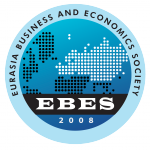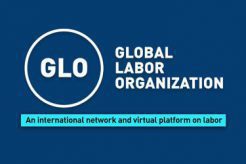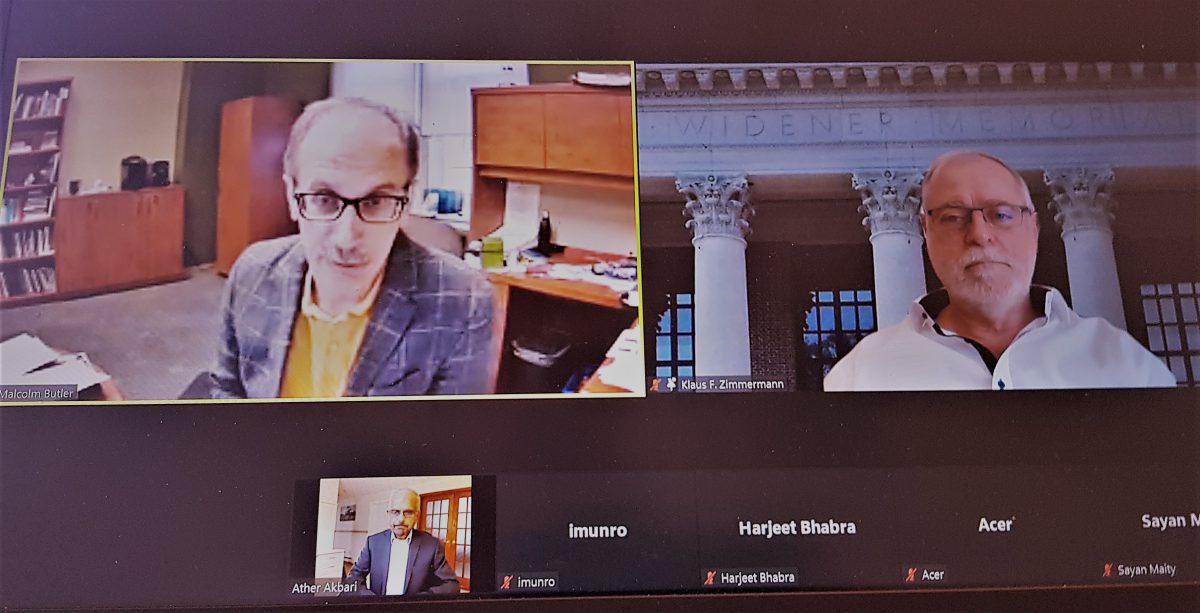October 5, 2021. Smelling change. Various media and political contacts in Berlin. First trip to the city since the pandemic.
Ends;
October 5, 2021. Smelling change. Various media and political contacts in Berlin. First trip to the city since the pandemic.
Ends;
A new GLO Discussion Paper suggests that introducing public subsidies aimed at favoring R&D disclosure represents a win-win result for firms and society.
GLO Discussion Paper No. 940, 2021
A contribution to the theory of R&D investments – Download PDF
by Buccella, Domenico & Fanti, Luciano & Gori, Luca
GLO Fellow Luca Gori
Author Abstract: This research contributes to the theory of cost-reducing R&D investments by offering a tractable three-stage non-cooperative Cournot duopoly game in which R&D-investing firms choose whether to disclose R&D-related information to the rival. Though in a noncooperative context firms have no incentive to unilaterally disclose information on their costreducing R&D activity to prevent the rival from freely appropriate it, this work shows that there is room for the government to design an optimal policy aimed at incentivising unilaterally each owner towards R&D disclosure. Under this welfare improving policy, sharing R&D-related information becomes a Pareto efficient Nash equilibrium strategy of selfish firms. These findings suggest that introducing public subsidies aimed at favouring R&D disclosure represents a win-win result, eliminating the so far established – and unpleasant for both firms and society – non-disclosing outcome.

GLO Discussion Papers are research and policy papers of the GLO Network which are widely circulated to encourage discussion. Provided in cooperation with EconStor, a service of the ZBW – Leibniz Information Centre for Economics, GLO Discussion Papers are among others listed in RePEc (see IDEAS, EconPapers). Complete list of all GLO DPs – downloadable for free.
The Global Labor Organization (GLO) is an independent, non-partisan and non-governmental organization that functions as an international network and virtual platform to stimulate global research, debate and collaboration.
Ends;
A new GLO Discussion Paper observes a positive impact of telehealth services on self-reported physical and mental health.
GLO Discussion Paper No. 939, 2021
Leveraging technology to promote women’s health: Evidence from a pilot program – Download PDF
by Ahmad, Hamna & Hussain, Sadia & Nazif, Muhammad Ahmed
GLO Affiliate Sadia Hussain
Author Abstract: We investigate the causal impact of offering telehealth services to female microfinance borrowers on their health and bargaining power in the household. Using a balanced panel of 1218 female borrowers, we observe a positive impact of offering telehealth services on self-reported physical and mental health of treated relative to control women. Treated women seek healthcare more proactively; they are more likely to consult a doctor and they do so sooner, as compared to control women. In addition, treated women report greater inclusion in household decision-making. We also find positive spillover effects of offering telehealth services within the household, where we observe a greater likelihood of the spouse and children (of treated women) to seek health care.

GLO Discussion Papers are research and policy papers of the GLO Network which are widely circulated to encourage discussion. Provided in cooperation with EconStor, a service of the ZBW – Leibniz Information Centre for Economics, GLO Discussion Papers are among others listed in RePEc (see IDEAS, EconPapers). Complete list of all GLO DPs – downloadable for free.
The Global Labor Organization (GLO) is an independent, non-partisan and non-governmental organization that functions as an international network and virtual platform to stimulate global research, debate and collaboration.
Ends;
The 37th EBES Conference will take place online on October 6-8 2021. GLO is a co-organizing partner, and FOM University of Applied Sciences is the local host supporting the event from Berlin. EBES, the Eurasia Business and Economics Society, and FOM University of Applied Sciences both are strategic partners and institutional supporters of GLO. GLO President Klaus F. Zimmermann is also President of EBES. FOM and GLO contribute own sessions as listed below.
CONFERENCE PROGRAM WITH PARTICIPATION DETAILS: LINK
https://ebesweb.org/wp-content/uploads/2021/10/37th-EBES-Conference-Program_2021.pdf
General inquiries: ebes@ebesweb.org
An overview of the GLO-related contributions can be found below:
TIME STRUCTURE (All CET Berlin time)
Wednesday, October 6:
9.00 – 9.45. Welcome Speeches: Mehmet Bilgin (EBES & GLO), Manuela Zipperling (FOM & GLO), and Azita Berar Awad (Graduate Institute of International and Development Studies, Geneva, & GLO)
Opening Lecture: Klaus F. Zimmermann (UNU-MERIT, Free University Berlin & GLO)
The Future of Global Mobility
Chair: Mehmet Bilgin (Istanbul Medeniyet University, EBES & GLO)
15.15-16.15. Keynote Speech
David G. Blanchflower (Dartmouth College & GLO)
The Economics of Walking About and Predicting Unemployment
Chair: Matloob Piracha (University of Kent & GLO)
Background: GLO Discussion Paper No. 992
16.30-17.15. EBES Journals Session
Chair: Klaus F. Zimmermann (EBES President & GLO) with Dorothea Schäfer (DIW Berlin, Jönköping University & GLO), Editor-in-Chief of Eurasian Economic Review, and Marco Vivarelli (Catholic University of Milano & GLO), Editor-in-Chief of the Eurasian Business Review.
Thursday, October 7:
9.00-11.00. FOM-GLO Session
Chair: Alexander Spermann (FOM University of Applied Sciences, Cologne, Freiburg University and GLO)
14.00-15.00. Plenary Speech joint with the monthly GLO Seminar
Sriya Iyer (University of Cambridge and GLO):
Religion and Mental Health
Chair: Olga Popova (Leibniz Institute for East and Southeast European Studies, CERGE-EI & GLO)
Note: The session relates to the Springer Nature Handbook project “Labor, Human Resources and Population Economics” supported by the GLO network.
15.15 – 17.15. GLO Session Migration I
Chair: Cynthia Bansak (St. Lawrence University & GLO)
Note: The session relates to the Springer Nature Handbook project “Labor, Human Resources and Population Economics” supported by the GLO network.
Friday, October 8:
14.15 – 16.15. GLO Session Family & Household Economics
Chair: Victoria Vernon (SUNY Empire State College & GLO)
Note: The session relates to the Springer Nature Handbook project “Labor, Human Resources and Population Economics” supported by the GLO network.
16.30 – 18.30. GLO Session Migration II
Chair: Marina Murat (University of Modena and Reggio Emilia & GLO)
Note: The session relates to the Springer Nature Handbook project “Labor, Human Resources and Population Economics” supported by the GLO network.



Ends;
A new GLO Discussion Paper finds only a very small or insignificant impact of changes in the real minimum wage on unemployment entries and exits in Greece.

GLO Discussion Paper No. 937, 2021
Unemployment transitions and the role of minimum wage: from pre-crisis to crisis and recovery – Download PDF
by Andriopoulou, Eirini & Karakitsios, Alexandros
GLO Fellows Eirini Andriopoulou & Alexandros Karakitsios
Author Abstract: During the last decade, unemployment in Greece climbed up to 28%, almost quadrupling due to the economic crisis that hit Greece. In the present paper, we examine the determinants of the unemployment dynamics and the impact of the minimum wage on the probability of making a transition into and out of unemployment. We use micro-level data from the Greek Labour Force Survey for the period 2004-2019 and control for several demographic factors, macro-economic conditions, regional differences and changes in statutory minimum wage. The results suggest that individual-level characteristics play an important role in making a transition into or out of unemployment. Changes in the real minimum wage are estimated to have either a statistically insignificant or a very small impact on unemployment entries and exits. Further, the impact of economy’s growth rate follows the theoretical predictions as higher growth rates increase unemployment outflows and decrease inflows, while the regional differences are also important. Our findings persist even when we split the sample in three periods (pre-crisis, crisis, recovery). The results have important policy implications. Given that the disemployment effect of the minimum wage seems to be very limited in the Greek labour market, while the socioeconomic characteristics and regional characteristics play an important role, improving the skills of individuals through the educational system and reskilling or up-skilling programs, while targeting specific regions, may facilitate labour market mobility.

GLO Discussion Papers are research and policy papers of the GLO Network which are widely circulated to encourage discussion. Provided in cooperation with EconStor, a service of the ZBW – Leibniz Information Centre for Economics, GLO Discussion Papers are among others listed in RePEc (see IDEAS, EconPapers). Complete list of all GLO DPs – downloadable for free.
The Global Labor Organization (GLO) is an independent, non-partisan and non-governmental organization that functions as an international network and virtual platform to stimulate global research, debate and collaboration.
Ends;
On the invitation of ARGEIAD, Sobey School of Business, Saint Mary’s University, Canada, Klaus F. Zimmermann, President of the Global Labor Organization (GLO) and UNU-MERIT, Maastricht, spoke on September 29, 2021 in a public online lecture on:
Global Mobility after the Pandemic
The meeting was chaired by Dr. Ather Akbari, Ph.D., Professor of Economics at the Sobey School of Business, Saint Mary’s University, and head of ARGEIAD. More details. ARGEIAD, the Atlantic Research Group on Economics of Immigration, Aging and Diversity, focuses on the economic significance of immigration, diversity and aging. The center provides a platform to researchers, policymakers, policy practitioners and business organizations to exchange ideas and conduct research on these issues in a regional, national and international context.









Discussant Tony Fang, Stephen Jarislowsky Chair in Cultural and Economic Transformation, Memorial University of Newfoundland

Abstract: “Global Mobility after the Pandemic“
Covid-19 has challenged the way humanity is organizing global welfare through cooperation and the division of work. Key causes of the spread of the virus have been the conditions of human mobility and exchange. The ultimate solution had been to restrict such mobility. Among the response mechanisms were home-work and internet collaborations. What are the long term consequences after the end of the pandemic? Will this end globalization? Or cause a faster transition into the future of work? And will the pandemic ever come fully to an end? The lecture will deal with those questions. It will work out the importance of migration and mobility for the creation of human welfare and development through the law of the division of work. It will review the experiences with the “Spanish Flu”, which early in the 20th century contributed to the end of the largely globalized world existing at the time before World War I. Will history repeat? It will then study the experiences we have so far with the mobility consequences of the pandemic and which innovations are under way dealing with it. The conclusions will speculate about the consequences for the future of migration.
Selected References:
Ends;
A new GLO Discussion Paper studies determinants of self-rated physical and mental health of sexual minorities. Among other factors, increased aggregate unemployment deteriorates physical and mental wellbeing.

GLO Discussion Paper No. 936, 2021
Social Rejection, Family Acceptance, Economic Recession and Physical and Mental Health of Sexual Minorities – Download PDF
by Drydakis, Nick
GLO Fellow Nick Drydakis
Author Abstract: Utilizing two panel datasets covering the periods 2013-2014 and 2018-2019, the study examines whether social rejection, family acceptance, and economic conditions bear an association with self-rated physical and mental health of sexual minorities. Social rejection bears a negative association with physical and mental health. Family acceptance shares a positive association with physical and mental health. Periods characterized by worse economic conditions (2013-2014 versus 2018-2019) correlate with a decline in sexual minorities’ physical and mental health. It is found that women, trans people, people without higher education degrees, unemployed people, and relatively poor people, experience worse physical and mental health than the corresponding reference categories. The study indicates that sexual minorities who experienced societal rejections, such as unfair treatment in educational, workplace environments, and/or services (public/health) prompted deteriorated physical and mental health. Sexual minorities who experienced acceptance from their families over their sexual orientation status, experienced better physical and mental health. Moreover, during periods of increased aggregate unemployment, the physical and mental health status of sexual minorities was deteriorated. Antidiscrimination policies help reduce homophobic incidents and positively impact sexual/gender identity minorities’ progression, self-esteem, income, and well-being. Public health services should ensure that policies are inclusive of the physical and mental health needs of sexual/gender identity minority groups. Addressing financial hardships for minority population groups should form part of the policymakers’ agenda. This is among the first international studies to examine whether, during a period of economic recession, sexual minorities experience deteriorated physical and mental health.

GLO Discussion Papers are research and policy papers of the GLO Network which are widely circulated to encourage discussion. Provided in cooperation with EconStor, a service of the ZBW – Leibniz Information Centre for Economics, GLO Discussion Papers are among others listed in RePEc (see IDEAS, EconPapers). Complete list of all GLO DPs – downloadable for free.
The Global Labor Organization (GLO) is an independent, non-partisan and non-governmental organization that functions as an international network and virtual platform to stimulate global research, debate and collaboration.
Ends;
A new GLO Discussion Paper studies the role of formal institutions of contract enforcement in facilitating investments in small and medium firms in India.
GLO Discussion Paper No. 935, 2021
Caste, Courts and Business – Download PDF
by Chakraborty, Tanika & Mukherjee, Anirban & Saha, Sarani & Shukla, Divya



GLO Fellows Tanika Chakraborty, Anirban Mukherjee & Sarani Saha
Author Abstract: We study the role of formal institutions of contract enforcement in facilitating investments in small and medium firms(MSME). In a framework where established entrepreneurs can enforce contracts informally using their network ties and hierarchical advantage, we argue that an efficient formal judiciary helps entrepreneurs without any ties to informal business networks, disproportionately more. We test our theoretical prediction using a novel administrative panel-data from Indian courts and the nationally representative MSME survey data. Empirically, we treat entrepreneurs from disadvantaged castes (SC-ST) as those without traditional business-network ties. We find that improvement in court quality has a disproportionately larger impact on the investment decisions of SC-ST entrepreneurs. On average, if the time taken for a court to clear all existing cases reduces by 1 year, the initial gap in the probability of investing, between SC-ST and other entrepreneurs, gets reduced by 0.6-0.7 percentage points.

GLO Discussion Papers are research and policy papers of the GLO Network which are widely circulated to encourage discussion. Provided in cooperation with EconStor, a service of the ZBW – Leibniz Information Centre for Economics, GLO Discussion Papers are among others listed in RePEc (see IDEAS, EconPapers). Complete list of all GLO DPs – downloadable for free.
The Global Labor Organization (GLO) is an independent, non-partisan and non-governmental organization that functions as an international network and virtual platform to stimulate global research, debate and collaboration.
Ends;
The new GLO Discussion Paper studies the linkages between the institutional environment and labor-management relations.
GLO Discussion Paper No. 934, 2021
Labor-Management Relations and Varieties of Capitalism – Download PDF
by Schneider, Martin R.

Author Abstract: The varieties-of-capitalism (VoC) approach distinguishes liberal market economies (LMEs) such as the USA and coordinated market economies (CMEs) such as Germany based on institutional differences in terms of corporate governance, industrial relations, company relations as well as education and training. According to the VoC approach, firms differ in the ways in which they combine market and non-market mechanisms to coordinate their activities. Firms in LMEs are considered to rely more on market or exit mechanisms than firms in CMEs, which more often complement market with non-market or voice mechanisms. This chapter summarizes what has been learned from the VoC approach on the linkages between the institutional environment and labor-management relations. Various important lessons can be drawn. Employment protection legislation is a productive element within the institutional setup of CMEs. LMEs tend to induce strong overall wage dispersion, whereas in some CMEs such as Germany the labor market performance varies markedly by skill type and gender. The recent literature also indicates that the institutional setup is more complex than the VoC approach suggests, calling for revisions to the approach. In particular, some countries are hybrid economies that combine elements of both types of capitalism. The CME-LME dichotomy does not appreciate the true variety of country-specific skill systems. Finally, multinational enterprises overcome institutional boundaries of different types of capitalism in ways that were not included in the original VoC approach.

GLO Discussion Papers are research and policy papers of the GLO Network which are widely circulated to encourage discussion. Provided in cooperation with EconStor, a service of the ZBW – Leibniz Information Centre for Economics, GLO Discussion Papers are among others listed in RePEc (see IDEAS, EconPapers). Complete list of all GLO DPs – downloadable for free.
The Global Labor Organization (GLO) is an independent, non-partisan and non-governmental organization that functions as an international network and virtual platform to stimulate global research, debate and collaboration.
Ends;
A new GLO Discussion Paper studies the history and effects of marriage bars, the requirement that women working in certain jobs must leave that job when they marry.
GLO Discussion Paper No. 933, 2021
Economics of Marriage Bars – Download PDF
by Mosca, Irene & Wright, Robert E
GLO Fellows Irene Mosca & Robert E Wright

Author Abstract: A Marriage Bar is the requirement that women working in certain jobs must leave that job when they marry. In the twentieth century, Marriage Bars were not unusual internationally. In the late 1800s to early 1900s, legislative provisions that required women to resign at marriage were introduced in several countries around the world, including Australia, Canada, Ireland, the Netherlands and the UK. Spill-overs to jobs not strictly covered by the Marriage Bar were also common. This chapter critically reviews, from an economics perspective, the background, the history and the impacts of Marriage Bars. This chapter has four aims. The first is to summarise the arguments provided by government officials and employers to justify both the introduction and the retention of Marriage Bars. The second is to provide a cross-country comparison of Marriage Bars. The third is to investigate the potential impacts of the Marriage Bar on women’s behavior with respect to employment, marriage and education. The fourth is to highlight potential avenues for future research. Although Marriage Bars do not exist anymore, they are still a serious topic of current debate. Much more can be learned about important topics, such as discrimination, from carrying out research focused on Marriage Bars.

GLO Discussion Papers are research and policy papers of the GLO Network which are widely circulated to encourage discussion. Provided in cooperation with EconStor, a service of the ZBW – Leibniz Information Centre for Economics, GLO Discussion Papers are among others listed in RePEc (see IDEAS, EconPapers). Complete list of all GLO DPs – downloadable for free.
The Global Labor Organization (GLO) is an independent, non-partisan and non-governmental organization that functions as an international network and virtual platform to stimulate global research, debate and collaboration.
Ends;